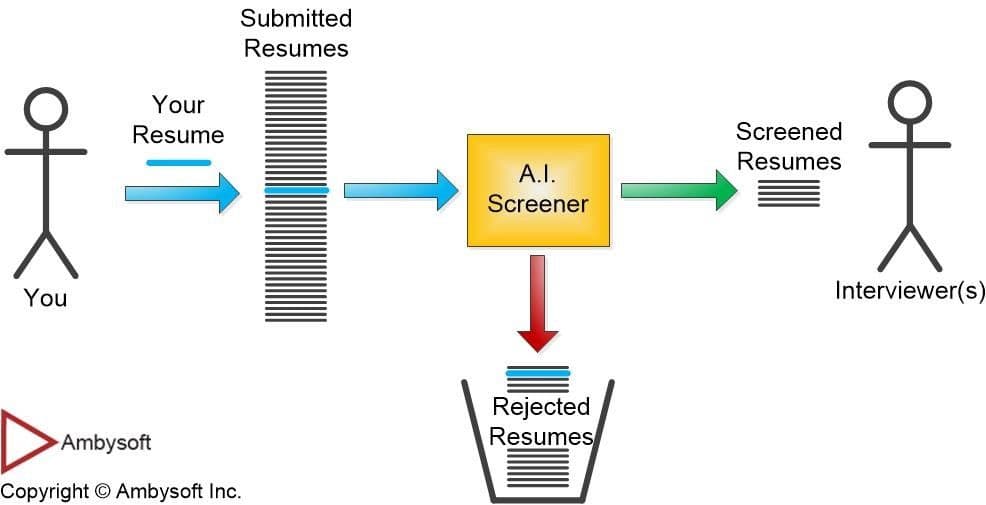In the rapidly evolving job market, especially post-pandemic, candidates are constantly seeking innovative strategies to distinguish themselves from the competition and secure their dream jobs by crafting compelling résumés. Despite their efforts, job seekers encounter intense competition across all career stages and expertise levels. Glassdoor's statistics reveal a daunting reality: only 3% of the 250 résumés typically submitted for corporate job openings receive interview invitations. This underscores the fierce competition job applicants face.
Moreover, the widespread use of Applicant Tracking Systems (ATS) by employers, including nearly all Fortune 500 companies, adds another layer of challenge to the job application process. These systems, utilized by up to 90% of employers, screen job applications to manage the influx of résumés. Alarmingly, only about 25% of résumés make it past the ATS to be reviewed by a human recruiter. This means a staggering 75% of résumés are rejected by these systems, often due to issues related to formatting, content, or the strategic use of keywords. The ATS acts as a gatekeeper, filtering out résumés that don't meet certain criteria before they even reach the human eye. This highlights the critical importance of not only presenting a strong résumé but also ensuring it is ATS-friendly to increase the chances of it being seen by a recruiter. Many job seekers today may not be fully aware of the latest HR trends and the importance of understanding the dynamics of the digital age, especially when it comes to job hunting. In the current labor market, a generic resume is unlikely to stand out to recruiters or rank highly in applicant tracking systems. A well-crafted, customized resume is important for securing interviews and landing high-paying jobs, regardless of one's experience level or field of expertise.However, "Artificial Intelligence" has also become a valuable tool for job seekers, helping to streamline the resume-writing process and optimize resumes for success. The birth of AI has significantly changed the resume writing landscape, transforming how resumes are crafted, optimized, and evaluated. This technology not only improves the quality of resumes but also enhances the chances of job seekers catching the attention of employers. In this blog post, we'll explore how AI is reshaping resume writing and improving job seekers' prospects. Let's get started!
Many job seekers today may not be fully aware of the latest HR trends and the importance of understanding the dynamics of the digital age, especially when it comes to job hunting. In the current labor market, a generic resume is unlikely to stand out to recruiters or rank highly in applicant tracking systems. A well-crafted, customized resume is important for securing interviews and landing high-paying jobs, regardless of one's experience level or field of expertise.However, "Artificial Intelligence" has also become a valuable tool for job seekers, helping to streamline the resume-writing process and optimize resumes for success. The birth of AI has significantly changed the resume writing landscape, transforming how resumes are crafted, optimized, and evaluated. This technology not only improves the quality of resumes but also enhances the chances of job seekers catching the attention of employers. In this blog post, we'll explore how AI is reshaping resume writing and improving job seekers' prospects. Let's get started!
Recruiters and HR managers favor resumes that are straightforward and easy to read, particularly when they have to go through numerous applications. AI technology now enables job seekers to craft more impactful resumes. It ensures consistency in style and formatting, reducing the likelihood of typos or formatting errors, resulting in a professional-looking resume.AI-powered tools also offer content analysis and suggestions to enhance the structure and content of a resume. They prompt users to include relevant skills and accomplishments and provide feedback on keyword optimization. These tools compare resumes against industry standards and best practices, helping to create content that effectively highlights the user's abilities and experiences.Job seekers can use AI Resume Builders to select preferred formats and customize their resumes to align with industry norms and job descriptions. This customization helps ensure that the resume stands out, increasing the chances of capturing the attention of potential employers.
AI has transformed the job search experience, offering unmatched benefits and convenience. It simplifies the process, making it easier for job seekers to discover suitable opportunities. However, it's essential to recognize that AI shouldn't be the sole reliance. While it's a valuable tool, it can't replace human intuition.Job seekers should view Artificial Intelligence as a supportive tool that enhances their capabilities. It aids in optimizing their resume and identifying potential matches. Yet, assessing soft skills and cultural fit requires human judgment and insight.To strike a balance, it's vital to integrate human input into the job search process. When considering AI suggestions, job seekers shouldn't blindly accept them. Instead, they should blend their own insights and experiences to customize their resume accordingly. This ensures the resume reflects their unique personality and professional strengths.By amalgamating the advantages of AI and human input, job seekers can create a resume that's both technically proficient and emotionally resonant to human recruiters. This approach guarantees the resume stands out and effectively showcases the job seeker's best qualities. AI serves as a valuable asset in every job seeker's toolkit, aiding in navigating the competitive job market and supporting the job search process. It not only assists in crafting professional resumes but also offers guidance throughout the journey, ensuring you stay on course. Given the time-consuming nature of job hunting, this proves to be a significant time-saver. By utilizing AI-driven resume writing tools, job seekers can greatly enhance their job search efforts. These tools enable the creation of standout resumes tailored to specific job requirements, optimized for applicant tracking systems, and visually appealing. With AI's confident assistance, gaining a competitive edge, streamlining efforts, and boosting the chances of securing desired interviews become achievable goals. The efficiency AI brings to the table is truly remarkable.While AI-generated resumes offer numerous advantages, striking a balance between AI assistance and human input is essential. The future of resume writing is likely to combine AI tools for swiftly crafting standard resumes meeting modern standards. However, integrating a personal touch is crucial to highlight individuality and stand out from the crowd. As technology advances, the collaboration between human insights and AI capabilities will remain pivotal in crafting compelling resumes that capture employers' attention.
AI serves as a valuable asset in every job seeker's toolkit, aiding in navigating the competitive job market and supporting the job search process. It not only assists in crafting professional resumes but also offers guidance throughout the journey, ensuring you stay on course. Given the time-consuming nature of job hunting, this proves to be a significant time-saver. By utilizing AI-driven resume writing tools, job seekers can greatly enhance their job search efforts. These tools enable the creation of standout resumes tailored to specific job requirements, optimized for applicant tracking systems, and visually appealing. With AI's confident assistance, gaining a competitive edge, streamlining efforts, and boosting the chances of securing desired interviews become achievable goals. The efficiency AI brings to the table is truly remarkable.While AI-generated resumes offer numerous advantages, striking a balance between AI assistance and human input is essential. The future of resume writing is likely to combine AI tools for swiftly crafting standard resumes meeting modern standards. However, integrating a personal touch is crucial to highlight individuality and stand out from the crowd. As technology advances, the collaboration between human insights and AI capabilities will remain pivotal in crafting compelling resumes that capture employers' attention.
Moreover, the widespread use of Applicant Tracking Systems (ATS) by employers, including nearly all Fortune 500 companies, adds another layer of challenge to the job application process. These systems, utilized by up to 90% of employers, screen job applications to manage the influx of résumés. Alarmingly, only about 25% of résumés make it past the ATS to be reviewed by a human recruiter. This means a staggering 75% of résumés are rejected by these systems, often due to issues related to formatting, content, or the strategic use of keywords. The ATS acts as a gatekeeper, filtering out résumés that don't meet certain criteria before they even reach the human eye. This highlights the critical importance of not only presenting a strong résumé but also ensuring it is ATS-friendly to increase the chances of it being seen by a recruiter.


#1: Crafting Effective Content and Polished Layout
Recruiters and HR managers favor resumes that are straightforward and easy to read, particularly when they have to go through numerous applications. AI technology now enables job seekers to craft more impactful resumes. It ensures consistency in style and formatting, reducing the likelihood of typos or formatting errors, resulting in a professional-looking resume.AI-powered tools also offer content analysis and suggestions to enhance the structure and content of a resume. They prompt users to include relevant skills and accomplishments and provide feedback on keyword optimization. These tools compare resumes against industry standards and best practices, helping to create content that effectively highlights the user's abilities and experiences.Job seekers can use AI Resume Builders to select preferred formats and customize their resumes to align with industry norms and job descriptions. This customization helps ensure that the resume stands out, increasing the chances of capturing the attention of potential employers.#2: Enhancing Language and Grammar Skills
There's nothing more cringe-worthy than submitting a job application only to realize your resume is riddled with errors. Such slip-ups not only look unprofessional but could also cost you your dream job. Mistakes in spelling, grammar, and sentence structure can seriously undermine the credibility of your resume.Clear and effective communication is key in resumes. AI-powered tools with advanced language processing capabilities can spot and fix these issues, helping job seekers polish their language use. These AI systems scrutinize sentence structure, grammar, and word choice, offering suggestions to boost the overall quality of writing. This ensures that resumes are impeccable, articulate, and accurately reflect the applicant's qualifications.Employers, even when considering highly qualified candidates, value meticulousness. Tools like Grammarly or an AI resume builder are fantastic for proofreading resumes and steering clear of those awkward blunders. They help ensure your resume is not only free of errors but also professionally presented and ready to impress.#3: Customization and Keyword Enhancement
The days of one-size-fits-all resumes are behind us. Today, AI systems with sophisticated algorithms excel at customizing resumes to meet specific job requirements. By highlighting relevant experiences and skills and adjusting the language and tone, AI ensures each resume is uniquely tailored for a particular job opportunity. This level of personalization significantly boosts the chances of grabbing employers' attention and securing interviews.Moreover, incorporating industry-specific terminology and jargon into a resume is a key strategy for differentiation. Many companies use Applicant Tracking Systems to manage the influx of resumes and streamline the hiring process. These systems search for keywords and rank resumes based on predefined criteria, making it crucial for job seekers to include relevant keywords in their resumes.Thankfully, job seekers can leverage AI resume generators to identify and incorporate prominent keywords related to various job titles into their resumes. Another approach is to ask AI tools like ChatGPT for trending keywords associated with specific positions, allowing for a more targeted and effective resume.AI's role in optimizing resumes for ATS and highlighting desirable qualities is invaluable. While it doesn't guarantee an interview, using job-specific keywords can significantly enhance a resume's visibility among other applicants. AI-driven resume writing tools not only benefit the recruitment process but also increase the visibility of resumes in ATS. By carefully reviewing their resumes, hiring managers can ascertain if applicants have the requisite experience, improving the likelihood of advancing past the initial screening phase.Thus, by using industry-specific keywords and phrases relevant to a particular job and strategically integrating AI into their resume creation process, job seekers can enhance their visibility and increase their chances of being shortlisted for an interview.#4: Ensuring Equal Opportunities and Fairness
Unconscious biases in recruitment can lead to unintentional discrimination during hiring. Artificial Intelligence (AI) can help reduce these biases by evaluating resumes based on specific, objective criteria during the initial screening process. This minimizes the influence of subjective judgment and ensures that candidates are assessed fairly based on their skills and qualifications, without regard to gender, ethnicity, or other personal characteristics.The objectivity of AI allows it to focus solely on a candidate's skills and qualifications presented in their resume, ensuring a fair assessment without subjective biases. By removing identifying information and applying objective criteria, AI facilitates a transparent and fair evaluation process. This ensures that candidates are evaluated solely on their merits and qualifications, regardless of their background or personal characteristics.However, it's important to approach the design of AI algorithms with caution to avoid embedding any unintended biases into the system. Regular monitoring and auditing of AI systems are essential to maintain ethical standards and ensure ongoing fairness and equality in the hiring process. As AI technology advances, its role in transforming resume writing and the job search landscape is expected to grow, potentially shaping the future of recruitment.#5: Real-Time Feedback and Suggestions
Asking for feedback on a resume can be daunting, especially during its creation. Fortunately, with the advent of artificial intelligence (AI) tools, job seekers now have access to immediate feedback and valuable suggestions that can significantly enhance their resumes. These innovative tools not only suggest better action verbs and alternative phrases but also provide insights grounded in industry best practices. This allows job seekers to make necessary adjustments in real time, crafting compelling content that effectively highlights their skills and experiences. As a result, by fine-tuning their resumes before submission, they greatly enhance their prospects of securing desired job opportunities.#6: Effectively Streamlining the Recruitment Process
AI-driven systems have significantly impacted resume screening, transforming it from a manual, time-consuming, and potentially biased task into an efficient, fair, and objective process. These systems leverage advanced technologies like machine learning algorithms and natural language processing to analyze resumes effectively. This not only speeds up the hiring process by identifying candidates with the desired experience, skills, and qualifications quickly but also ensures a level playing field by eliminating human biases.With these technologies, recruiters can sift through a large volume of applications in no time, focusing their efforts on the most promising candidates. This efficiency not only saves valuable time but also significantly reduces the chances of overlooking talented applicants due to human error or subjective judgment. Moreover, by automating the initial stages of the recruitment process, AI-driven systems allow recruiters to dedicate more time to engaging with candidates on a personal level, further enhancing the selection process.In essence, the adoption of AI in resume screening has made the recruitment process more efficient, fair, and focused, ensuring that no deserving candidate slips through the cracks. This technological advancement supports recruiters in their quest to find the perfect match for a job, promising a future where talent and opportunity meet more seamlessly than ever before.#7: Enhancing Visual Appeal
Ensuring a resume's visual appeal is essential for its effectiveness. With the integration of AI technology, job seekers now have access to a wide array of tools that can enhance the visual aspects of their resumes. These AI-powered design tools analyze layout, fonts, and formatting options, offering users suggestions for visually appealing templates. Additionally, there are AI resume builders that provide thousands of industry-specific or position-specific templates. This innovative technology helps job seekers present their information in a professional and engaging way, increasing their chances of standing out from other applicants. By crafting visually captivating resumes with AI assistance, job seekers make a memorable impression on potential employers, enhancing their likelihood of success.#8: Efficiency in Time and Cost Reduction
One major advantage of AI-driven resumes lies in their efficiency, both in terms of time and cost. Crafting a resume traditionally consumes a significant amount of time, but with AI technology, a well-structured resume can be generated within minutes, saving job seekers valuable time. This is especially beneficial for those needing multiple resumes for various job applications, allowing them to do so efficiently.Furthermore, utilizing AI-powered resume builders often proves more economical than hiring a professional resume writer. It offers a budget-friendly alternative for individuals seeking high-quality resumes without the expense of personalized services. By harnessing AI technology, job seekers can save money while obtaining polished resumes that impress potential employers and unlock new opportunities. Here are the top five cutting-edge resume builders for 2024, poised to elevate resumes and capture recruiters' attention.Key Takeaway: Balancing AI and Human Input
AI has transformed the job search experience, offering unmatched benefits and convenience. It simplifies the process, making it easier for job seekers to discover suitable opportunities. However, it's essential to recognize that AI shouldn't be the sole reliance. While it's a valuable tool, it can't replace human intuition.Job seekers should view Artificial Intelligence as a supportive tool that enhances their capabilities. It aids in optimizing their resume and identifying potential matches. Yet, assessing soft skills and cultural fit requires human judgment and insight.To strike a balance, it's vital to integrate human input into the job search process. When considering AI suggestions, job seekers shouldn't blindly accept them. Instead, they should blend their own insights and experiences to customize their resume accordingly. This ensures the resume reflects their unique personality and professional strengths.By amalgamating the advantages of AI and human input, job seekers can create a resume that's both technically proficient and emotionally resonant to human recruiters. This approach guarantees the resume stands out and effectively showcases the job seeker's best qualities.
The Final Word

